Sacred Animals in Japan: See Japan's Religion Through Its Animals

There is a great overlap between the animals that you find in Japan and those held sacred at shrines and temples. Here are some of the most important creatures to Japanese religion and where you can find them in Japan.
While there are plenty of adorable wild animals that call Japan home, there are also many that have held a special place in the hearts of the Japanese for generations.
These sacred animals are often the messengers of Shinto or Buddhist deities or are symbolic of Japan as a whole.
Sacred Animals in Japan
1. Komainu: Shrine Guardians
2. Foxes
3. Sacred Cows
4. White Snakes
5. Monkeys
6. Rabbits
7. Deer
8. Frogs
9. Cranes
10. Turtles
11. Manekineko: Beckoning Cats
12. The 12 Animals of the Chinese Zodiac
1. Komainu: Shrine Guardians
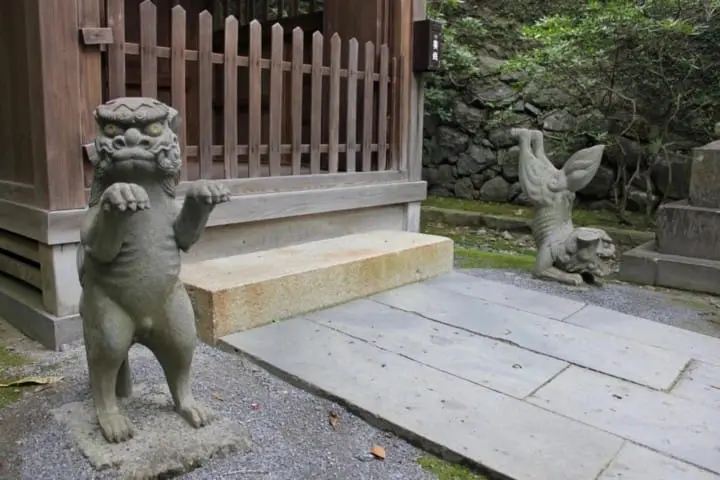
Komainu are the stone lion-dog statues that stand at the entrances to many shrines across Japan. These dogs are said to be protectors and messengers for the deities of that particular shrine, which is why you may find different creatures standing guard at different shrines.
The origin of the komainu is debated, with some saying they came from China, others believing them to be a representation of a different mythical creature. In either case, any visit to a shrine would not be complete without looking at these sometimes fierce, sometimes friendly statues.
Not every shrine has komainu however - some have rabbits, monkeys, and wolves, or ookami. Actually, wild wolves are extinct in modern Japan, but in the past, there were many more throughout the countryside.
If you want to visit an ookami shrine in particular, then Mitsumine Shrine in Chichibu, Saitama, or Musashi Mitake Shrine on Mount Mitake, Tokyo, would be your best choices in the greater Tokyo area.
↑ Return to the top of article.
2. Foxes - Divine Messengers of Inari
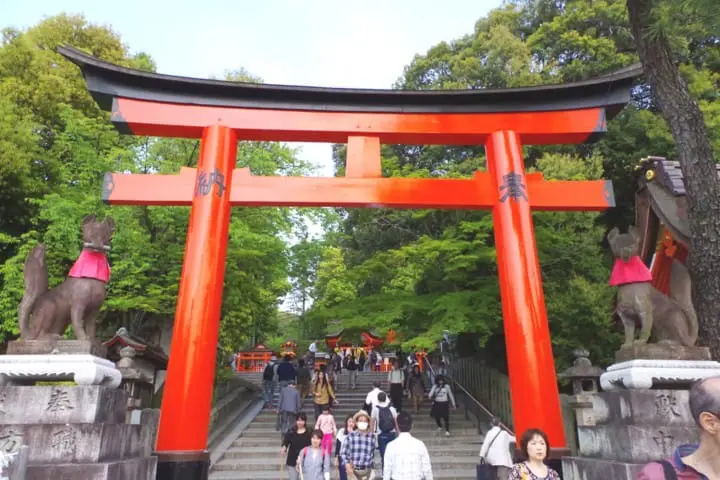
The messenger of the harvest god Inari is the fox. So strong is the identification of this deity with foxes that the fox statues you can see on shrine grounds have also come to be called Inari in Japanese.
Inari shrines, found throughout Japan, have statues of foxes standing watch over them - sometimes only two at the entrance, or there may be over a hundred of them, such as at Keihin Fushimi Inari Shrine, in Musashi Kosugi in Kawasaki, Kanagawa.
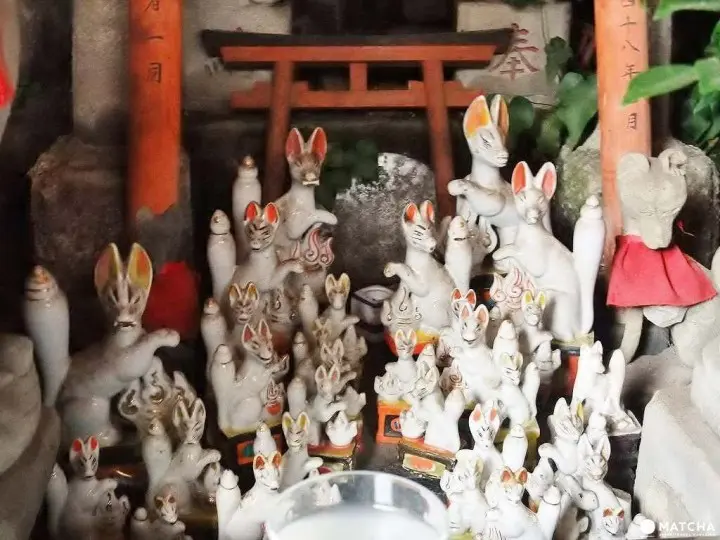
Foxes play an important role in Japanese religion and folk culture; wherever you find the term 'inari' in a shrine name, you'll know that the guardian creature of that shrine is a fox.
Kyoto's Fushimi Inari Taisha is the head shrine of the roughly 3,000 shrines in Japan with 'inari' in their names, but you can also find these foxes in Oji, in Tokyo, and even hidden away at a tiny shrine in the shopping haven of Ginza.
↑ Return to the top of article.
3. Sacred Cows: Tenmangu Shrines
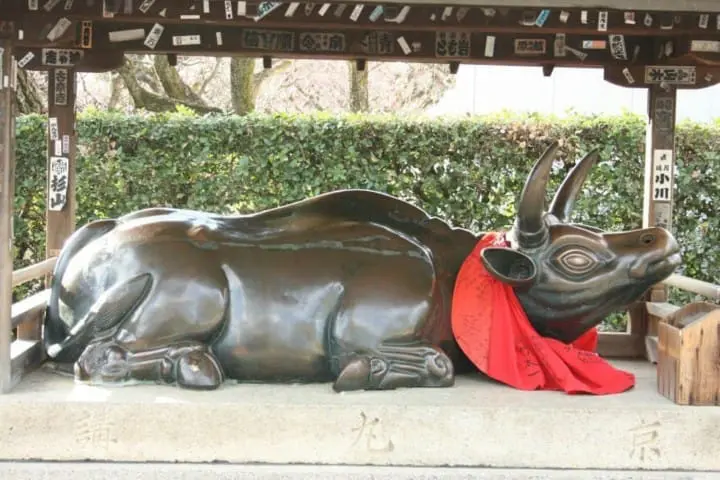
While to some cows may seem like dull or not very bright creatures, they are actually very smart - so much that, in Japan, they have come to be associated with the god of scholars, Tenjinsama.
At Kitano Tenmangu Shrine in Kyoto, you will find a variety of cow statues, some life size and some quite small. According to legend, at the time of Sugawara no Michizane's (*1) banishment, all the cows in the area began to weep.
*1... Sugawara no Michizane (845 - 903) - A nobleman, scholar, and politician during the Heian Period who is deified as the god of knowledge at Kitano Tenmangu Shrine.
↑ Return to the top of article.
4. White Snakes - Sacred to Benzaiten
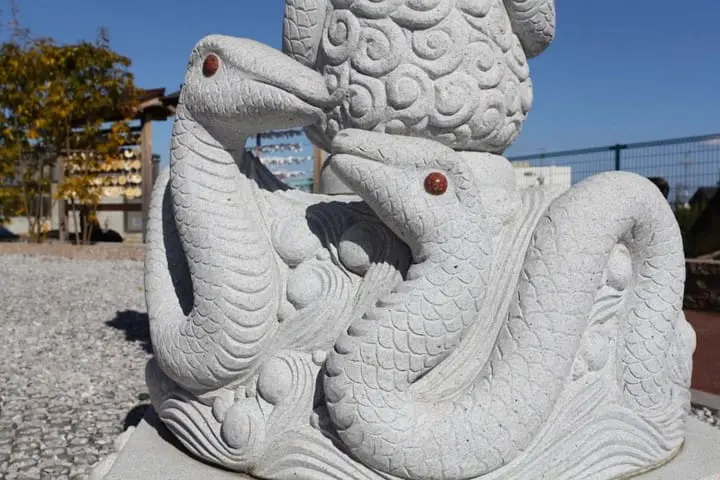
Benzaiten is the Japanese Buddhist goddess of the arts and monetary success and is one of the Shichifukujin, or Seven Gods of Good Fortune. Originally she is connected to the image of water and of things flowing, which is why her guardian animal and messenger became the snake. Specifically, a large white snake.
Shirohebi Jinja, a Shinto shrine dedicated to Houkan Shirohebi Benzaiten, can be found in Iwakuni, Yamaguchi prefecture, alongside a white snake research and preservation center where you can visit these peaceful snakes for yourself.
↑ Return to the top of article.
5. Monkeys - Family Blessings
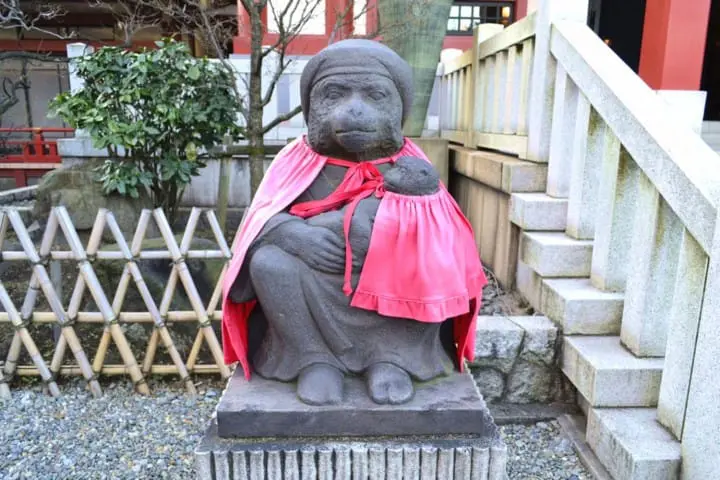
In Nagatacho, Tokyo, you will find Hie Shrine. Despite this area being a hub of business and politics, Hie Shrine is perhaps best known as being a fertility and safe childbirth shrine. Japanese monkeys are often referred to as being prolific parents, and good ones at that, so it makes sense that these monkeys would come to symbolize parenting to the Japanese.
If you are hoping to start a family soon, or just really like monkeys, make sure to pay a visit to Hie Shrine and pick up some of their omamori charms.
↑ Return to the top of article.
6. Rabbits
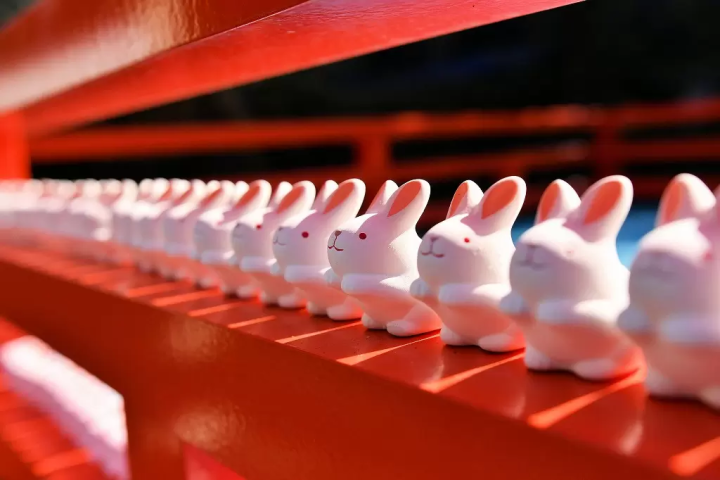
Photo by Pixta
Rabbits are seen in Japan as god's messengers and symbolize fortune, moving forwards, and intelligence. Additionally, rabbits are also connected to the Shinto deity of agriculture and fertility, making them a symbol of abundance. Japan has an ample amount of Japanese legends that feature these adorable beings.
Famous tales include Tsuki no Usagi - the tale of a rabbit pounding mochi rice on the Moon - the reason we have the Moon Harvest Festival.
There is also the White Hare of Inaba, featured in Japan's creation myths compiled in the Kojiki chronicle. It is the story of a white hare injured by sharks, later saved by Okuninushi, one of Japan's famous gods. After this, the rabbit foretells Okuninushi that he will marry Princess Yakami, resulting in him becoming a king.
Scattered across the country, Japan has multiple rabbit spots to enjoy, such as Okazaki Shrine, Kyoto's rabbit shrine bursting with rabbit motifs, and Okunoshima, Japan's rabbit island!
Read also
↑ Return to the top of article.
7. Deer
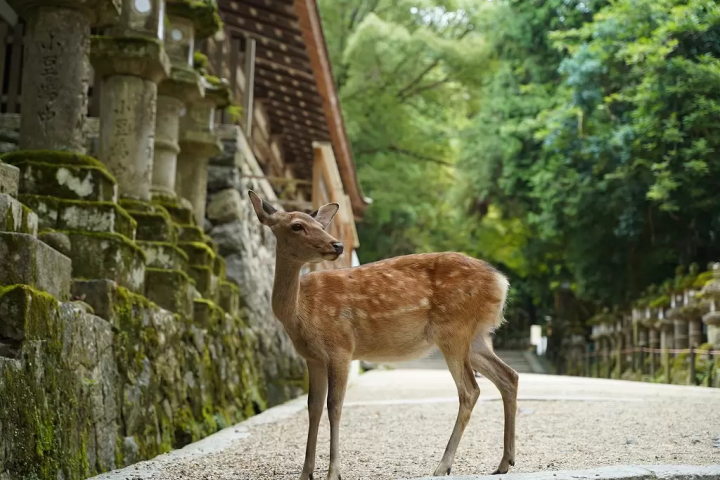
Photo by Pixta
Deer in Japan symbolize peace and prosperity, and due to many legends and tales of deities descending to the world on deer, they are also seen as sacred messengers of the gods.
Famous in Japan for centuries, deer are beloved animals that have become a must-see for many traveling across the country. Places such as Yakushima Island in Kagoshima, Miyajima Island in Hiroshima, and Nara are sought-after attractions due to the wild, free-roaming deer that coexist with the nation!
Nara itself holds significant importance for these creatures; around 1,400 deer live in Nara Park, each protected as a natural monument since 768!
This incredible appreciation of deer began with a famous Shinto tale telling the story of the god of thunder, who rode a white deer from Kashima Jingu Shrine in Ibaraki to Mt. Kasuga when the emperor designated Nara as the capital of Japan. Since then, all deer have been seen as sacred!
Read also
↑ Return to the top of article.
8. Frogs - a Talisman for Safe Travels
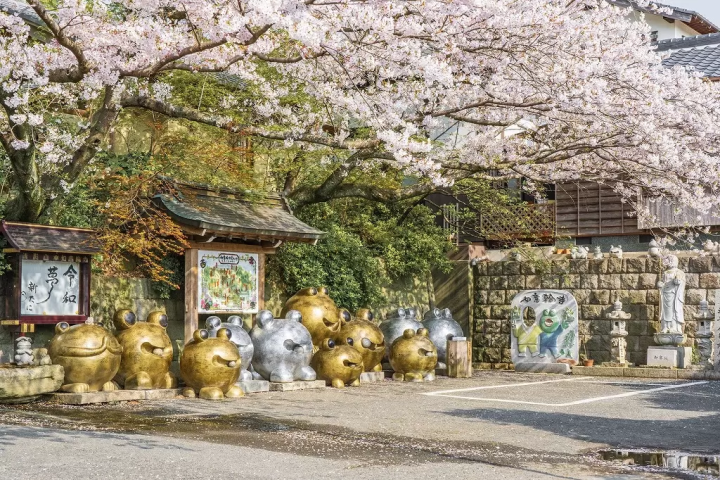
Photo by Pixta
Frogs in Japanese culture symbolize fertility, good luck, and protection. The Japanese word "kaeru" translates to both "frog" and "to return." For this reason, frogs have been seen as good talismans for safely returning home from travels!
Frogs and toads are prevalent in Japanese stories and media. Most notable is the legend "The Tale of the Gallant Jiraiya," an ancient tale of a noble ninja named Jiraiya who rides on the back of a toad on a quest to defeat an evil serpent demon. This tale has inspired an array of manga, video games, and artists to this day.
Across Japan, there are countless frog spots; examples include Nawate-Dori, a street in Matsumoto City brimming with frog motifs and goods, Mt. Tsukuba and its Gamaishi—a frog rock formation said to bring good luck—and shrines like Mizumiya Shrine in Saitama and Seieizan Nyoirin-ji Temple in Fukuoka!
↑ Return to the top of article.
10. Cranes

Photo by Pixta
Cranes, along with turtles, are symbols of good luck and longevity in Japan and have been celebrated as such since ancient times! In particular, these beautiful birds hold a special place in the hearts of the Ainu, the indigenous people of Hokkaido, who have rituals such as the Sarorun Rimse—a fascinating dance imitating the graceful movements of these birds in honor of their ancestors and gods.
Beyond the Ainu people's incredible storytelling and ancient symbols, Japan features these majestic animals in a variety of art forms, from kimonos to pottery. There is also the belief that by folding 1,000 paper cranes, one can get to live one thousand years; this tradition is known as Senzaburu.
↑ Return to the top of article.
10. Turtles
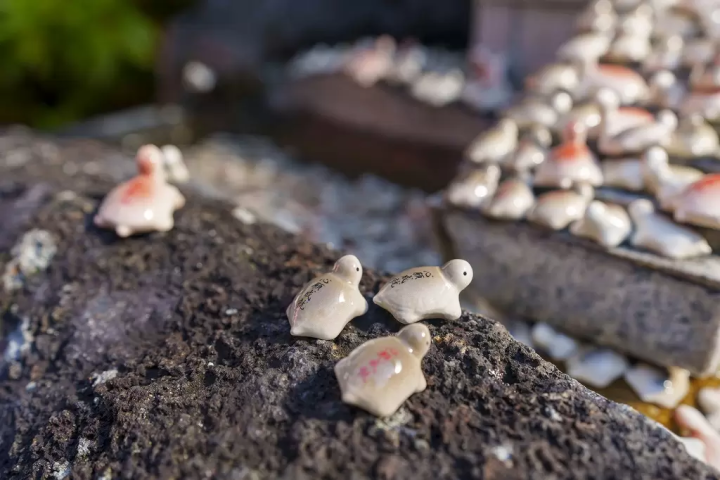
Photo by Pixta
A symbol of longevity and good luck, turtles can be found across Japan's sacred shrines and temples, sunbathing on rocks and swimming in ponds. These unique creatures have been a part of Japanese folklore and legends for centuries. One of the most well-known legends is about Minogame, a gigantic 10,000-year-old turtle who works alongside Jurojin, one of the seven lucky gods of Japan.
The Minogame is also featured in Japan's famous tale of Urashima Taro—a story of a young fisherman who saves a sea turtle from torture and, in thanks, is granted the right to visit Ryugujo, an underwater dragon kingdom! Although all is not what it seems, Taro meets a cruel fate upon returning to land.
About 30 minutes from the center of Osaka, travelers can visit Ishikiri Tsurugi Shrine, a sacred site with its own historic ties and traditions related to these revered creatures.
↑ Return to the top of article.
11. Manekineko: The Beckoning Cats
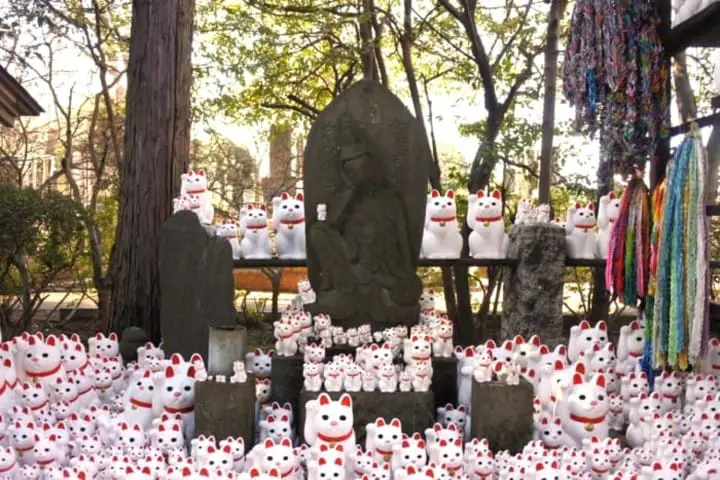
The manekineko, or beckoning cat, is an internationally known symbol of good luck found in shops and restaurants of all kinds all over the world. When its right paw is raised, it beckons financial fortune, and its left, customers. With one paw or the other up waving in customers and good fortune, the manekineko is a sight that cat lovers are sure to be thrilled by.
If you'd like to find yourself surrounded by manekineko of all shapes and sizes, then pay a visit to Gotokuji Temple in the Setagaya Ward of Tokyo. This temple is said to have been the origin of the manekineko itself. According to legend, the feudal lord of the time was saved from a thunderstorm by a cat beckoning to him at this very temple.
12. The 12 Animals of the Chinese Zodiac
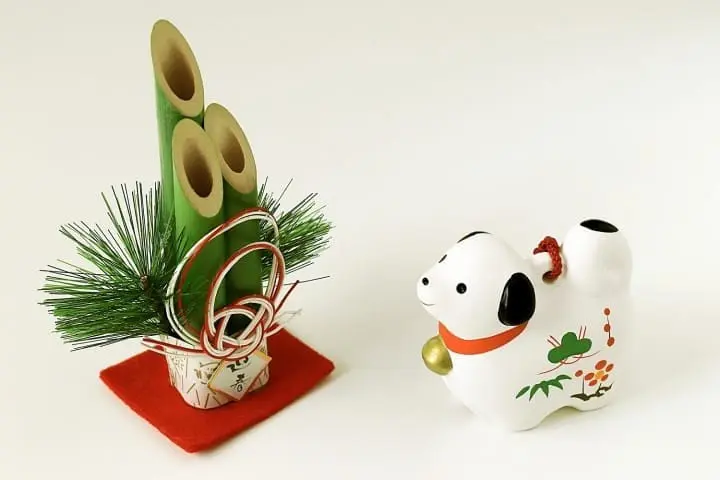
The eto is essentially the Japanese version of the Chinese zodiac: a system of 12 animals representing every year, with each animal having its own traits. 2018 is the Year of the Dog, but the other animals and their symbols are:
子 (Ne): Rat
丑 (Ushi): Ox
寅 (Tora): Tiger
卯 (U): Rabbit
辰 (Tatsu): Dragon
巳 (Mi): Snake
午 (Uma): Horse
未 (Hitsuji): Sheep
申 (Saru): Monkey
酉 (Tori): Rooster
戌 (Inu): Dog
亥 (Inoshishi): Wild Boar
In Japan, the representative animal changes each year, and this animal is often featured on Japanese nengajo, or New Year's Greeting Card. To learn more about eto, take a look at the article linked below.
Whether you are interested in Japanese history, religion or just a fan of animals, at temples and shrines across the nation you will find animals that have been both beloved by and sacred to the Japanese for generations. Why not see if you can find your own favorite creature in Japan too?
Read also
Main image by Pixta
Writer, translator, designer, weirdo.













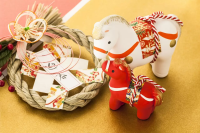




































![[Niigata] Skiing and snowboarding are just not enough! Fun snow spots for parents and children](https://resources.matcha-jp.com/resize/720x2000/2026/01/29-256901.webp)


![[Gunma, Nakanojo] Experience Japanese history in a wooden school building from the Meiji era](https://resources.matcha-jp.com/resize/720x2000/2025/12/25-254022.webp)
